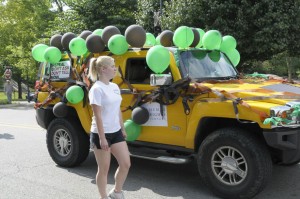Last month, “don’t ask, don’t tell,” the policy that banned gays and lesbians from serving openly in the U.S. military, was officially repealed. Liberals everywhere applauded the decision, cheering for the death of the discriminatory measure that had been a focal point for the Lesbian Gay Bisexual Transgender rights movement for more than a year.

This summer I worked for The Bilerico Project, an LGBT blog that required me to hone in on news related to the LGBT community. But as I read, I found myself buying into the importance of repealing DADT.
LGBT rights activists often reasoned that the legislation was one of the most prominent examples of delineated, obvious discrimination. DADT resulted in the discharge of about 13,000 gay and lesbian troops since President Bill Clinton signed it into law in 1993. The policy was designed to maintain the LGBT community as a subordinate group, activists argued. Thus, to achieve full equality, anti-LGBT policies like DADT needed to be eliminated.
I agree that policies like DADT function as barriers to fair treatment of the LGBT community. But as I read a more diverse range of perspectives on DADT, I began to question my support of its repeal. Wasn’t I prioritizing my desire for LGBT rights over my support of the anti-war movement?
Many responses to the DADT repeal were couched in fervent nationalism. We were encouraged to applaud the brave men and women who served in the military, regardless of their sexual orientation. We were told that it is every American’s right to serve. We felt compelled to be inspired by the gay soldiers who were discharged under DADT, but now planned to re-enlist.
This sense of nationalism and blind support of the U.S. military in the name of LGBT rights troubled me. I felt like one progressive cause — LGBT equality — was being hijacked in order to marginalize another — the peace movement.

The DADT repeal has already increased the influence of military recruiters in the country. Previously, some campuses restricted recruiters because DADT conflicted with the schools’ non-discrimination policies. Harvard University and other colleges are now allowing service members to recruit on campus since DADT is no longer in effect.
The military is even specifically targeting gays and lesbians for enlistment. An LGBT resource center in Tulsa, Okla., hosted U.S. Marines in September to help gays and lesbians better understand how they can serve. I wouldn’t be surprised if the marketing team for the Army or Navy uses the DADT experience as a theme for wooing gays and lesbians to enlist.
The debate puts my pro-LGBT and anti-war values at odds. Isn’t it contradictory to simultaneously be in favor of a more expansive military, but opposed to its activity?
On the one hand, I believe DADT was a legislative reinforcement that gays and lesbians are different — something “other.” The elimination of that reinforcement is a positive step forward for the LGBT rights movement. On the other hand, I believe in a smaller, less powerful military that doesn’t function as a dangerously pervasive facet of American society.
Though DADT was repealed, those with strong anti-war sentiments should not accept defeat. Repealing the military ban on gays and lesbians may give them the option of joining. But it’s still an option. And speaking out against that option can be anti-war activists’ new task.
Adam Polaski is a senior journalism major. Email him at [email protected]







